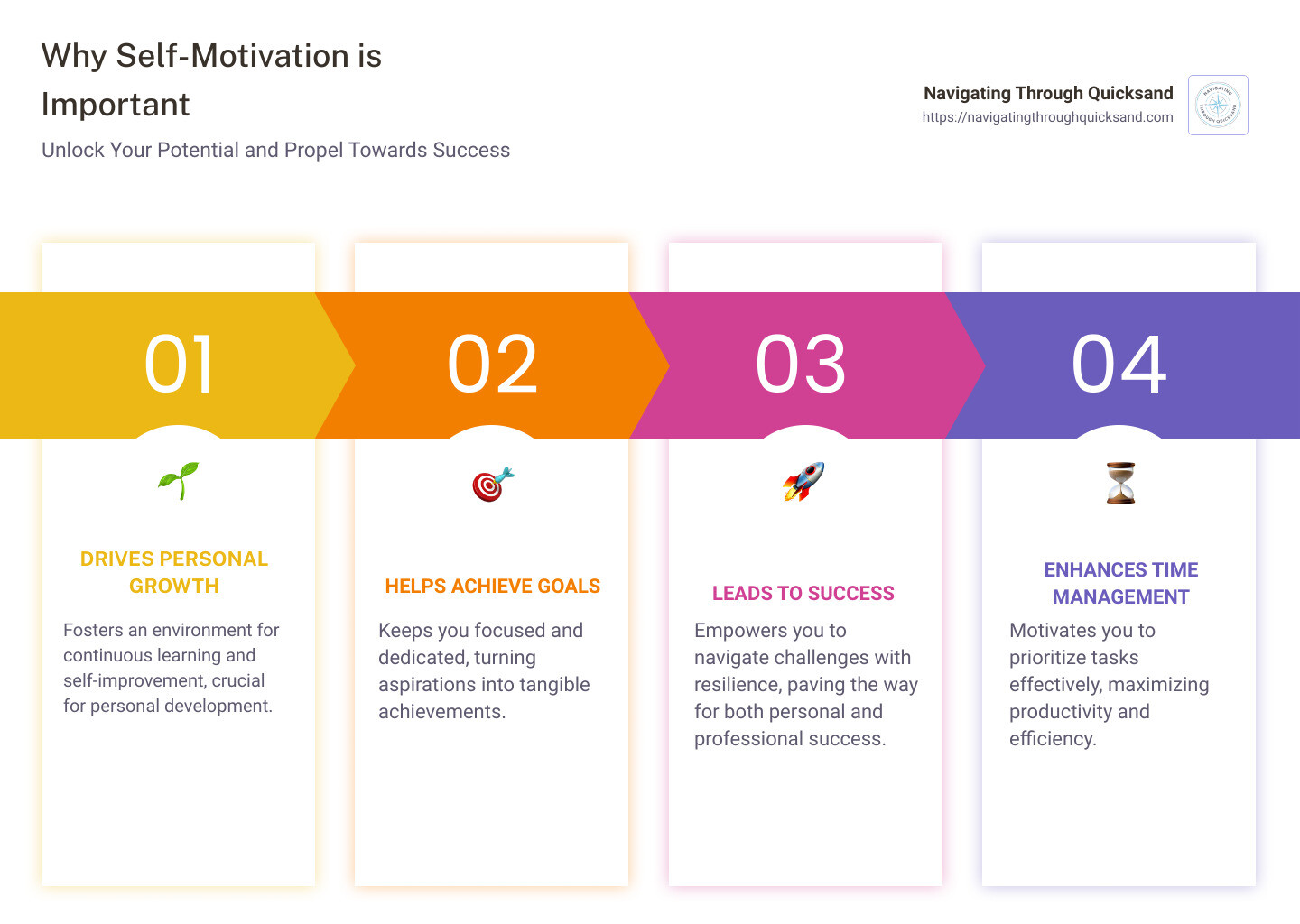Self-motivation is your internal drive to achieve, create, develop, and keep moving forward. When you’re motivated from within, you find the strength and courage to face the challenges life throws at you and turn them into opportunities for growth and success. This is especially crucial for busy professionals in New England who might feel stuck or overwhelmed.
With the right amount of self-motivation, you can transform your everyday challenges into stepping stones towards your goals. It’s not just about pushing through tough times to overcome obstacles, but about recognizing and harnessing your internal strength to steer your life in the direction you desire.
Why is Self Motivation Important?
- It keeps you driven, even when obstacles come your way.
- It fuels your desire to achieve your goals and fulfill your potential.
- It leads to personal and professional success, as self-motivated individuals are often more organized, confident, and excellent at managing their time.

Table of Contents
In this guide, we’ll uncover the essence of self-motivation and demonstrate why it’s the key to unlocking not just personal life satisfaction and success, but also professional excellence and fulfillment.
The Essence of Self-Motivation
Positive Thinking
At the heart of self-motivation is positive thinking. Imagine you’re facing a tough situation. If you focus on the negatives, you’re more likely to give up. But if you concentrate on the positives, you find the energy to keep going. It’s like when you’re hiking and it starts to rain. You can either focus on how wet and miserable you are or on the beauty of the rain and the fresh smell it brings. Positive thinking fuels your drive to push through challenges.
Personal Growth
Self-motivation is essential for personal growth. It’s the inner voice that encourages you to learn a new skill or read a book instead of watching TV all day. Think of it as planting a seed in your garden. With the right care and motivation, that seed will grow into a strong plant. Similarly, nurturing your self-motivation helps you grow and develop into a more capable, resilient person.
Achieve Targets
When it comes to achieving targets, self-motivation acts as your personal coach. It’s the force that gets you up for a morning run, helps you stay motivated to finish that online course, or drives you to meet your project deadlines. Remember how satisfying it feels to tick off something on your to-do list? That’s self-motivation rewarding you, pushing you closer to your goals, step by step.
Fulfill Potential
Self-motivation is about fulfilling your potential. It’s recognizing that you have the power to achieve great things and the determination to reach for them. Consider the story of Ashley Gustafson from Navigating Through Quicksand, LLC, who transformed life’s challenges into stepping stones toward success. Her journey of self-motivation led her to inspire others to navigate through their own adversities, proving that with the right mindset, overcoming obstacles and fulfilling one’s potential is within reach.
In the next section, we’ll delve into the types of self-motivation and how understanding them can help you harness your inner drive more effectively.
Types of Self-Motivation

Understanding why is self motivation important starts with recognizing the two main types: intrinsic motivation and extrinsic motivation. These are the engines that power our actions, and knowing how they work can help us steer our lives in the direction we want.
Intrinsic Motivation
This is all about doing something because it feels good or is personally rewarding. You’re not looking for a prize or a pat on the back from someone else. Instead, you’re driven by an internal desire to achieve, learn, or simply enjoy the process.
- Why it’s cool: It’s like being your own cheerleader. When you’re intrinsically motivated, you’re more likely to enjoy what you’re doing and stick with it, even when things get tough.
- Examples: Playing a game because it’s fun, not because you want to win. Learning a new language because you love the process, not because you need it for a job.
Extrinsic Motivation
This type is all about the carrot and the stick. You’re motivated by external rewards (like money, grades, or recognition) or the fear of negative consequences (like getting fired or failing a class).
- Why it matters: Sometimes, the things we need to do aren’t naturally fun or interesting. Extrinsic motivation can give us that nudge to get through tasks that might not be enjoyable but are necessary.
- Examples: Studying hard to get good grades, working late to earn a bonus, or cleaning your room to avoid getting in trouble.
Both intrinsic and extrinsic motivations are important and play different roles in our lives. By understanding and balancing these two forces, we can find the drive to achieve our goals, whether they’re about personal growth, career success, or just getting through our day-to-day tasks.
Why is self motivation important isn’t just about getting stuff done. It’s about finding your own reasons to push forward, whether they come from within or from the world around you. In the next section, we’ll explore how these motivations impact different areas of life, from education and work to sports and beyond.
Why Self-Motivation Matters

Educational Success
Why is self-motivation an important skill in education? Simply put, it’s the fuel that drives students to achieve their goals. Research shows that self-motivated students are more likely to set educational goals and persist through challenges. They’re the ones who stay up late to finish a project or spend extra hours on their studies, not because they’re told to, but because they have a personal drive to succeed. This drive leads to better grades, higher graduation rates, and a lifelong love of learning.
Work Performance
In the workplace, self-motivation is equally crucial. Self-motivated employees tend to take initiative, seek out new challenges, and go above and beyond their job descriptions. They don’t wait for a manager’s direction; they see what needs to be done and do it. This not only boosts their own career prospects but also contributes significantly to the company’s success.
As noted in the research, self-motivated employees are essential for leadership and increased productivity, making them invaluable assets to any organization.
Consumer Behavior
Self-motivation also plays a role in consumer behavior. Self-motivated consumers are proactive in researching products, seeking out the best deals, and making informed decisions. They’re not swayed easily by the influence of advertising or peer pressure; instead, they’re motivated by their own needs and desires.
This level of independence and critical thinking leads to smarter consumer choices and, ultimately, higher satisfaction with their purchases.
Athletic Success
In sports, self-motivation is often the difference between good athletes and great ones. It’s the inner drive that gets an athlete out of bed before dawn for training, pushes them to work hard through pain and exhaustion, and helps them bounce back from defeat stronger than before. Successful athletes are those who are motivated by a deep desire to improve, to overcome their limitations, and to achieve their personal best, regardless of external rewards.
In each of these areas, self-motivation is not just about achieving success in the traditional sense. It’s about personal growth, self-discovery, and the satisfaction that comes from pursuing one’s passions and interests. Whether it’s acing a test, excelling at work, making wise consumer choices, or winning a race, self-motivation empowers individuals to take control of their lives and carve out their own paths to success.
We’ll delve into how you can cultivate this invaluable trait within yourself, ensuring that you’re not only equipped to meet the challenges ahead but also to embrace them with enthusiasm and confidence.
How to Cultivate Self-Motivation
Cultivating self-motivation isn’t just about pushing yourself; it’s about understanding and harnessing the internal drivers that propel you forward. Let’s break down how to cultivate self-motivation into manageable steps.
Identifying Your Motivators
First things first, know what sparks your fire. Is it personal growth? Recognition? The satisfaction of completing a task? Ask yourself what really drives you. Reflecting on past successes can provide helpful clues. Motivators are personal and unique to each individual.
Creating a Positive Mindset
A positive mindset is your fuel. Here’s how to keep the tank full:
- Focus on the positive: Celebrate small victories and learn to see challenges as opportunities.
- Avoid negative self-talk: Replace “I can’t” with “I can” or “I’ll try”. Your words have power, so use them to build yourself up.
Staying Focused and Engaged
Staying focused means keeping your eyes on the prize. Here are some practical tips:
- Set clear goals: Know what you’re working towards and remind yourself regularly.
- Use reminders and deadlines: Technology can be a great ally in keeping you on track.
- Track your progress: Seeing how far you’ve come can be a great motivator to keep going.
Overcoming Challenges and Setbacks
Setbacks are inevitable, but they’re not the end of the road. When faced with challenges:
- Identify the cause: Understanding why something happened is the first step to preventing it in the future.
- Learn from mistakes: Every setback is a learning opportunity. Embrace them.
- Re-focus and take action: Adjust your plans if necessary and keep moving forward.
Developing Self-Discipline
Self-discipline is the backbone of self-motivation. Here’s how to strengthen it:
- Be consistent: Make a habit of working towards your goals, even on days when you’re not feeling 100%.
- Take responsibility: Own your actions and their outcomes, both good and bad.
- Avoid distractions: Find strategies that help you stay on task, whether it’s a quiet workspace or specific work hours.
Cultivating self-motivation is a journey, one that involves getting to know yourself deeply and accepting that setbacks are part of the process. By identifying your motivators, creating a positive mindset, staying focused, overcoming challenges, and developing self-discipline, you’re setting the stage for a fulfilling and successful path, both personally and professionally.
Remember that self-motivation is a skill that can be developed and honed over time. With patience, persistence, and the right strategies, you’ll find that you’re capable of achieving remarkable things.
Benefits of Being Self-Motivated

Gain Confidence
When you push yourself to achieve your goals, you start to believe in your abilities. This belief builds confidence. Imagine tying your shoes for the first time as a kid. It was tough, right? But once you did it, you felt unstoppable. That’s what self-motivation does for adults.
Achieve Success
Success isn’t just about luck. It’s about setting goals and reaching them. People who are self-motivated don’t wait for opportunities; they create them. Like a gardener planting seeds, they know that with care and effort, those seeds will grow into something beautiful.
Increase Productivity
Self-motivated individuals know how to manage their time. They set priorities and stick to them, much like a captain steering a ship through stormy seas. This focus and drive lead to higher productivity, as they’re always moving forward, making the most of each day.
Emotional Well-being
Being self-motivated is like having a sunny day inside to motivate you, even when it’s raining outside. It boosts your mood and keeps you feeling positive about the future. When you achieve your goals, you feel a sense of fulfillment and happiness that’s hard to beat.
Independence and Autonomy
Self-motivation gives you the freedom to choose your path. It’s like being the author of your own story. You decide what you want to do and then go for it, without needing someone else to push you. This independence is empowering, giving you control over your life and your future.
Why is self motivation important? It’s the engine that drives you toward your dreams, fuels your journey of personal growth, and helps you navigate through the quicksand of life’s challenges. With self-motivation, you’re not just surviving; you’re thriving.
We’ll explore strategies for maintaining this vital drive, ensuring that your reservoir of motivation never runs dry.
Strategies for Maintaining Self-Motivation
Maintaining self-motivation can sometimes feel like trying to keep a fire burning in the rain. It’s possible, but it requires consistent effort and the right techniques. Let’s dive into some effective, self motivating, strategies that can help keep your motivation alive, even during tough times.
Setting New Goals
Imagine you’re on a road trip. If you don’t know where you’re going, any road will take you there. But, if you have a destination in mind, every turn you make has a purpose. This is what goals do for self-motivation. They give you a direction and a reason to keep moving forward.
- Start Small: Break down your big goals into smaller, manageable tasks. Achieving these can give you a sense of progress and keep you motivated.
- Be Specific: Vague goals are hard to achieve. Make your goals as clear and detailed as possible.
- Set Deadlines: Deadlines create a sense of urgency that can spur you into action.
Celebrating Successes
Every step forward, no matter how small, is progress and deserves recognition. Celebrating your successes does wonders for your motivation. It’s like giving yourself a pat on the back and saying, “Well done, let’s keep going!”
- Reward Yourself: After reaching a milestone, treat yourself to something you enjoy. It could be as simple as a cup of your favorite coffee or a day off to relax.
- Reflect on Your Journey: Take time to look back at where you started and appreciate how far you’ve come. This can be incredibly motivating.
MANA Group’s Podcast “Searching for Mana”
Listening to stories of resilience, success, and motivation can light a spark within you. MANA Group’s podcast, “Searching for Mana,” is a treasure trove of such stories. It features interviews with successful individuals who share their journeys, struggles, and strategies for staying motivated.
- Learn from Others: Each episode provides valuable insights into how different people find and maintain their motivation.
- Find Relatable Stories: Hearing about challenges similar to yours and how others overcame them can be incredibly uplifting and motivating.
By incorporating these strategies into your life, you can maintain a high level of self-motivation. Self-motivation is not a constant; it’s normal for it to fluctuate. The key is to recognize when your motivation is waning and to take proactive steps to rekindle it. Setting new goals, celebrating your successes, and seeking inspiration from others can all help ensure that your motivation remains a powerful force in your journey towards success.
We’ll delve into the common challenges that can hinder self-motivation and how to overcome them, ensuring that you’re equipped to navigate through any quicksand you may encounter on your path.
Overcoming Common Challenges

In the journey of self-motivation, obstacles such as procrastination, lack of focus, and external pressures inevitably arise. Here’s how to navigate through these challenges effectively.
Procrastination
The dreaded “I’ll do it tomorrow” mentality can be a major roadblock. The key to overcoming procrastination is to break your tasks into smaller, manageable pieces.
Remember the advice: Stop thinking, start doing. Don’t allow room for overthinking; dive straight into action. Setting small, achievable goals can provide a sense of accomplishment that fuels further action.
Lack of Focus
In an era of constant distractions, maintaining focus can feel like an uphill battle. To combat this, establish a clear, distraction-free workspace and allocate specific times for work and breaks. Techniques such as the Pomodoro Technique—working for 25 minutes followed by a 5-minute break—can enhance focus and productivity. Self-discipline plays a crucial role here; it’s about training yourself to prioritize tasks over distractions.
External Pressures
External factors, including societal expectations and peer pressure, can derail self-motivation. It’s essential to stay focused and true to your own goals and values. Reflect on what truly matters to you and why you embarked on this journey. As highlighted in the research, self-motivated individuals are more self-reliant and less dependent on others for motivation or direction. This autonomy is your shield against external pressures.
Strategies to Keep Moving Forward
- Set Clear Goals: Know what you’re working towards. Clear goals provide direction and a sense of purpose.
- Positive Self-Talk: Replace negative thoughts with positive affirmations. Believe in your ability to overcome challenges.
- Learn from Setbacks: Instead of viewing setbacks as failures, see them as learning opportunities. What can you do differently next time?
- Seek Inspiration: Sometimes, a dose of inspiration can reignite your motivation. Listen to podcasts, read stories of people who’ve overcome similar challenges, or engage with motivational content like the MANA Group’s “Searching for Mana.”
Overcoming these common challenges requires a blend of practical strategies and a resilient mindset. By breaking tasks into smaller steps, maintaining focus, staying true to your personal goals, and learning from setbacks, you can navigate through the quicksand of procrastination, lack of focus, and external pressures. Self-motivation is a journey, not a destination. Each step you take, no matter how small, is a step towards achieving your goals and realizing your full potential.
We’ll explore how self-motivation not only benefits individuals in their personal growth and success but also plays a crucial role in enhancing workplace dynamics and academic achievements.
Self-Motivation in the Workplace
In work, self-motivation is not just a nice-to-have; it’s a must-have. Why is self-motivation important in the workplace? Let’s dive in.
Increased Productivity
Self-motivated employees are the engines of a company. They don’t wait for instructions to start their engines; they’re already in motion. They find ways to do their jobs more efficiently, often exceeding expectations. This drive leads to increased productivity. A study from the University of California found that motivated employees were three times more creative.
This creativity isn’t just about arts and crafts; it’s about solving problems in new ways, making processes faster, and coming up with innovative ideas that push the company forward.
Essential for Leadership
Leadership and self-motivation go hand in hand. A leader without self-motivation is like a car without fuel—it won’t go anywhere. Leaders must be self-starters to inspire their teams and drive them towards success. They set the pace and model the kind of motivation they want to see in their team members.
A self-motivated leader sees the bigger picture and motivates others to strive for more, not just meeting the basic requirements but exceeding them.
Self-Motivated Strength Example
Consider the story of a mid-level manager who transformed her department’s performance. Initially, the team was lagging, hitting just the minimum targets. However, this manager, through her self-motivation, began to innovate processes and set higher goals for herself and her team. She didn’t wait for directives; she was proactive.
Her drive and enthusiasm were contagious; her team began to emulate her, becoming more engaged and productive. The department not only met its targets but exceeded them, contributing significantly to the company’s growth.
This example illustrates that self-motivation in the workplace leads to a cycle of success. Self-motivated individuals are not just beneficial for their own careers but are invaluable assets to their teams and companies. They bring energy, creativity, and a can-do positive attitude, that can transform the workplace atmosphere, making it more dynamic, innovative, and ultimately, more successful.
In summary, self-motivation in the workplace is crucial for personal achievement, leadership effectiveness, and overall company success. It’s the spark that ignites passion, drives productivity, and leads to groundbreaking achievements.
As we continue to navigate through the challenges and opportunities in our professional lives, let’s remember the power of being self-motivated and how it can lead us to accomplish great things, both as individuals and as part of a team.
Self-Motivation for Students

In the academic world, self-motivation is not just a nice-to-have; it’s a must-have. This is where self-worth theory comes into play. It suggests that how students perceive their own capabilities plays a significant role in their motivation to learn and succeed. Essentially, if students believe in their ability to achieve, they’re more likely to put in the effort required to reach their goals.
Educational success is closely tied to self-motivation. Studies show that students who are self-motivated tend to perform better academically. This is because they’re driven by an internal desire to learn and improve, rather than external rewards or pressures. They set personal goals, work towards them diligently, and find satisfaction in their achievements, big or small.
However, overcoming academic challenges can be tough. Every student faces hurdles, but it’s their self-motivation that often determines whether they’ll overcome these obstacles or be hindered by them. For instance, a self-motivated student who struggles with a particular subject isn’t likely to give up easily. Instead, they might seek extra help, spend more time studying, or find alternative learning methods to improve their understanding.
But how can students cultivate this invaluable trait? It starts with recognizing their own intrinsic motivations—the personal satisfaction and fulfillment derived from learning and growing. Encouraging cooperative learning environments can also play a significant role. When students work together towards a common goal, they experience the joy of contributing to others’ success, which, in turn, boosts their own self-motivation.
Furthermore, adopting a mastery learning approach can be beneficial. This method allows students to learn skills at their own pace, offering continuous opportunities for practice and improvement until they achieve mastery. It shifts the focus from competition to personal growth, emphasizing effort and self-improvement over peer comparison.
Self-motivation empowers students to navigate through their academic journey with resilience and determination. It enables them to view challenges as opportunities for growth rather than insurmountable obstacles. By fostering a sense of self-worth and embracing the principles of self-motivation, students can unlock their full potential and pave the way for a successful and fulfilling future.
Let’s explore how self-motivation not only benefits students in their academic pursuits but also lays the foundation for lifelong learning and achievement.
Conclusion
In our journey through understanding why is self motivation important, we’ve uncovered that it’s the fuel that drives us to overcome challenges, achieve our goals, and fulfill our potential. Whether it’s in the realm of education, professional life, work, or personal development, self-motivation is the key that unlocks the door to success and satisfaction.
Self-motivation is not just about reaching your goals; it’s about enjoying the journey along the way. It’s about learning from setbacks, celebrating your successes, and always pushing forward towards a brighter future. It’s about understanding that, even when you feel stuck, you have the power within you to move deliberately and purposefully through any obstacle.
As we conclude our exploration of self-motivation, we invite you to reflect on your journey and consider how you can apply these principles in your own life. Whether you’re looking for new skills to enhance your work performance, achieve educational success, or simply live a more fulfilled and autonomous life, self-motivation is the key.
Contact us today a Navigating Through Quicksand, LLC, we believe that everyone has the potential to navigate through life’s challenges with grace and resilience. Our mission is to empower you to discover and polish the diamond within, using self-motivation as your guiding light. Through our expert speaking, coaching services, and interactive workshops, we aim to ignite your passion, inspire change, and help you create a life that reflects your true potential.
Let us help you navigate through your quicksand. Together, we can transform challenges into stepping stones toward success. Discover your amazingness, enhance your life, and exercise the power of self-motivation. Your journey starts now.
Are you ready to take the first step? Explore our services and let’s embark on this journey together.
Our Content
Our content is carefully created and edited by Ashley Gustafson to ensure that the content is accurate, reliable, and up-to-date. Navigating Through Quicksand, LLC is a trusted inspirational woman, inspirational speaker, and personal development coach in Massachusetts for confidence coaching programs for women such as leadership workshops, communication workshops, low self-confidence programs, fitness workshops, and more. Navigating Through Quicksand, LLC has empowered individuals with over 15 years of experience working with students and athletic teams from local communities.



